Teenagers don’t always say what they mean. They have not yet developed all the skills of emotional regulation. That means that often they don’t recognise the emotions they experience and they have a hard time managing their emotions.
This can lead to episodes of anger and upset. Anger is a secondary emotion. It masks feelings like anxiety, fear, sadness, loneliness, depression and pain. Other times teenagers will say nothing at all because they find it impossible to name and discuss the way they feel. They simply don’t know how they feel.
This slideshow was created using the artwork of students at Santa Maria College in Perth, Western Australia. The messages accompanying the artwork come from conversations students have with the school psychologist and mentors within the school. They are responses to the question, ‘What do you want your parents to know?’
When teenagers talk to you they seldom want advice or for you to fix things for them. Mostly they want to be heard and understood. They are in the process of establishing their identity separate from the influential adults in their lives. They need their voice to be recognised and validated.
Unfortunately, most people listen so that they can comment. It is hard to listen just to understand. You won’t agree with everything your teen says and you don’t have to, just don’t dismiss it out of hand. If you listen and empathise you will ensure that they keep talking to you. And that’s what we all want. Teenagers can also be startlingly insightful, so maybe listen with an ear for learning too.
Visit Linda’s Facebook page here
CREDIT: Jane Carmignani, Margo Bastow, Linda Stade, Year 10, 11 & 12 students at Santa Maria College, Western Australia.






